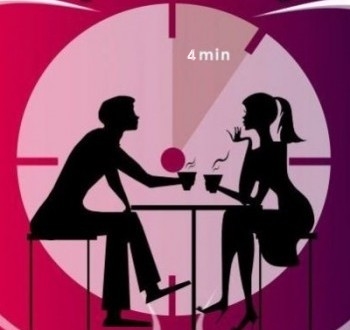Dating online? Speed dating offline!

Online vs. real life?
Found someone attractive among the rest? Swipe right at his/her photo. Wait a bit for the same action from another side… Got a match? The contact is established, have fun! This is how the dating process carries these days via the dating apps and at the mobile dating websites like Zoosk or Flirt.com. Bur what if we try to take that sequence and tempo to the day-to-day realities of the world beyond the web space? Let’s take speed dating for example. Would you come together with someone after the four minutes of communication?
That was the main question of the research conducted by two Stanford scholars Dan Jurafsky and Dan McFarland, who tried to find out how meaningful were the connections that were formed during speed dating. They made an attempt to analyzed the conversations between heterosexual people during speed dating meetings in order to know why some people do feel a strong sense of connection after that while and others seem not to feel it.
They analyzed about a thousand of dates to find out that words said on a date, mean much for establishing bonds. And not only words as such do matter, but also how they are delivered, when and for how long – all that makes a difference to how people feel toward each other, whether people felt that they had come together during their encounter or not.
Study and its results
The participants of the study were all graduate students at Stanford, and wore audio recording devices during the experiment. The participants had also to fill in pre- and post-date surveys. The dates were then transcribed and analyzed with the help of the computer software – namely, words and speech were processed to find out if any characteristics of the language matched the participants’ claiming about feeling connections.
The dates lasted four minutes each and, as it turned out, these four minutes were enough for building a meaningful relationship – at least some sort of connection that seemed to go beyond looks and motivation. Women, however, showed lower results of these connections than men (it proved that women are more selective in general). They also reported on the sense of connection to those men who used appreciative language (like “That’s awesome”) or signs of sympathy (“That must be really hard for you”). Both men and women reported on coming together if their conversations were mainly about the women.
The researchers underlined also that the longer it took people to decide on a real date that was proposed afterwards, the more they reported having a really bonding experience, suggesting communication can actually alter the feelings about another person and break the association with traits.


